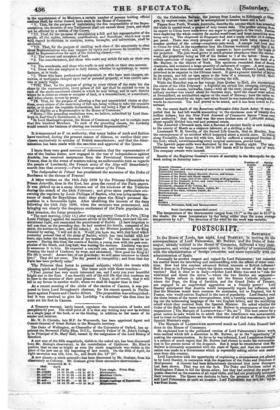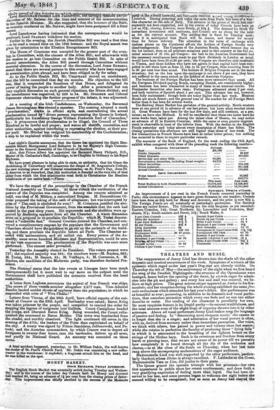PO S TSCRIPT.:
SATURDAY.
In the House of Lords, last night, Lora in moving for the correspondence of LOrd Palmerston, Mr. BulWer,'Whd the Duke of Soto- mayor, already noticed in the House of Commons, 'delivered a very clear, impressive, and withal temperate speech, on the impolicy of intermeddling with the administration of foreign countries, and more especially with the administration of Spain.
Personally he avowed respect and regard for Lord Palmerston; but censured his morbid desire for interfering and intermeddling with the affairs of other coun- tries. How had this conduct advanced British interests or British influence? Had it done so in Portugal—where the Queen evades the -terms of the last con- vention? Had it done so in Italy—whither Lord Mint° was sent to "ride the whirlwind and direct the storm "— where the two Sicilies are separated— where Naples refuses to tolerate any but the Roman Catholic religion where. the Pope, the King of Sardinia, and the Grand Duke of Tuscany, are engaged in an unprovoked aggression on a friendly power? Lord Stanley anticipated that Austria would temporarily regain her influence, and that the Milanese would have recourse for assistance, not to England, but to France who would outrun England in the race of popularity. Lord Stanley read the three letters of the recent correspondence, with a running commentary, point- ing out the unbecoming language of the two English letters, and the mortifying rebuff which they received from the Spanish Minister. He asked whether the Order of the Bath had been conferred on Mr. Bulwer in consequence of that cor- respondence [The Marquis of Lasurnowrirs—" No, no."] The best course for a great nation to take would be, to admit that the, interference was unwarranted, and to trust to Castilian honour for the withdrawal of all that was offensive in the Spanish Minister's reply. The Marquis of LA14sDoWNE answered much as lord John Russell had done in the House of Commons.
He explained how in the published version of Lord Palmerston's letter words were omitted which left a discretion to Mr. -Bulwer, as to the 4 opportunity lel making the communication. So far as he was informed, Lord Lansdowne thought it a subject of much regret that Mr. Bulwer had 'chosen to make his communal tion in the precise terms of the despatch. But it must be remembered that Mr. Bnlwer is intimately acquainted with the state of Spain, and that the communi- cation was made to a Government which is repeatedly" asking advice and assist- ance from this country. Lord Lansdowne took the opportunity of explaining a circumstance not alluded to by Lord Stanley, in connexion with the departure of the Duke and Dutchess of Montpensier. A rumour had been ilidustrionsly circulated that some disrespect had been shown. That was not the fact. The Duke and Dutchess called at Buckingham Palace to bid the Queen adieu; but they had omitted the usual eti-- quette observed on the occasion of all royal visits, and had not previously intimated their intention. The Queen was desirous to have the presence of Prince Albert and Lord Palmerston on-such an occasion: Lord Palmerston was sent for; but be was from home. eholy Proof of the hrtio.ht to. mis;a11 e Lord BROUGHAM excused Lord ratmersron;tufgalfg1S, ilainfkr cifTEift discretion of Mr. Bulwer for the time and manner of his communication to the Spanish Minister. He also suggested, that the honours of the Bath, so recently conferred on Mr. Bulwer, might have been postponed till a fitter season-
Lord Lansdowne having intimated that the correspondence would be
produced, Lord STANLEY withdrew his motion. Earlier in the evening, the Jewish Disabilities Bill was read a first time —to be read a second time on the 18th instant; and the Royal assent was given by commission to the Eleotion Recognizances Bill. The House of Commons was occupied for the greater part of the even- ing, in Committee, with the clauses of the Alien Bill; and afterwards with the motion to go into Committee on the Public Health Bill. In spite of several amendments, the Alien Bill passed through Committee without material alteration. In the course of the discussion, Lord Joule RUSSELL stated that there are several persons in this country who have been engaged assassination-plots abroad, and have been obliged to fly for safety.
As to the Public Health Bill, Mr. URQUHART moved an amendment, that the bill be committed that day six months. His objection to the bill was, that it suspended the functions of that House, and delegated its power of taxing the people to another body. After a protracted but not very explicit discussion on such general objections, the House divided; and the amendment was negatived, by 229 to 54. Mr. SPOONER and Colonel S1BT11ORP obstructing the further progress of the debate, it was adjourned.



























 Previous page
Previous page